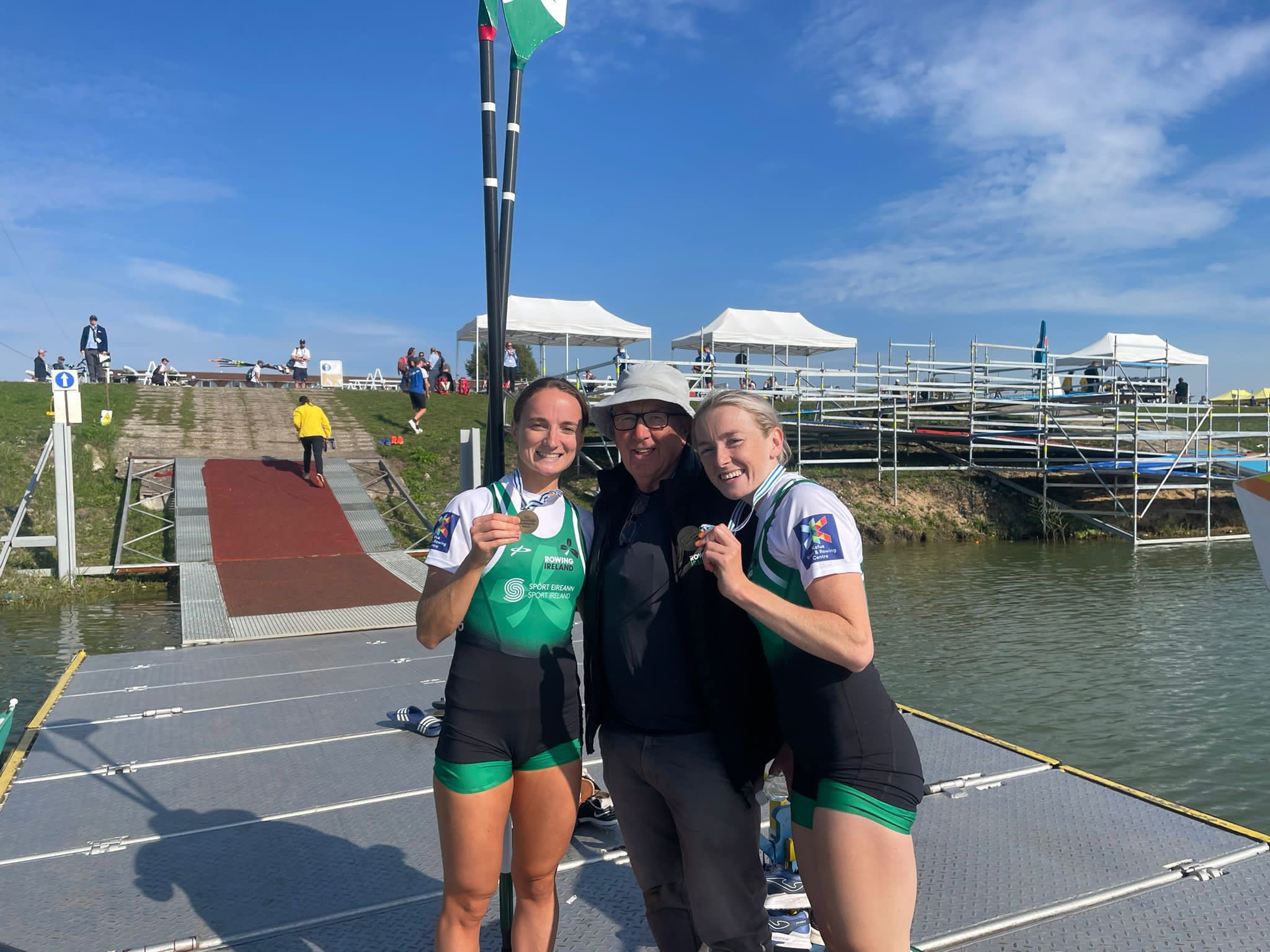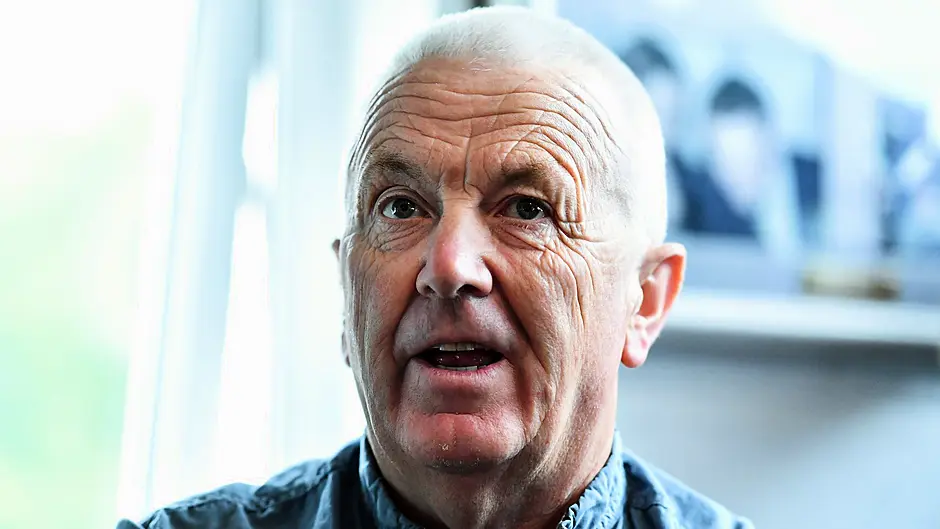
AOIFE Casey knows the ins and outs of Dominic Casey better than most. He’s her dad, first, and also her coach. She sees him at home when he is dad and at training when he is Coach Casey. Two different Dominics. Then there are those beautiful moments when those two worlds entwine.
At the recent World Rowing Championships Aoife and Rochestown rower Margaret Cremen surged to a breakthrough bronze in the Irish women’s lightweight double sculls.
It’s a major moment for the 23-year-olds. The performance and medal that announces their arrival on the big stage.
This is a young crew moving in the right direction. They qualified for the Olympic Games last year, perhaps ahead of schedule. The duo finished eighth in Tokyo; an encouraging result overshadowed by medals elsewhere. They’ve been patient. It’s been a process, overseen by Dominic Casey, the coach of Rowing Ireland’s lightweight group.
Before the women’s lightweight double A final Coach Casey kept his advice simple and succinct. His trademark.
‘Stick with them.’
‘Use your strength’
‘Use your legs.’
‘I think you can do it, you know,’ he repeated. ‘I think you can do it.’
And they did it. Brilliant bronze.
They met him when they came into the slipway after their race. He took their oars. Cremen recalls thinking he seemed overwhelmed. Dominic had just coached his daughter, Aoife, to her first senior world medal. That’s a proud moment for any dad. It was a massive moment for this pairing, too. And their coach.
‘He hugged us both and said it was a really great race,’ Cremen adds.
‘It’s been a long journey so to be able to celebrate with him after the race, the three of us, was really special,’ Aoife explains.
Incredibly, that was the 31st medal that Coach Casey has masterminded for Rowing Ireland as lightweight coach. He didn’t have to wait long for number 32 on a Super Saturday in Racice. Twenty minutes later Paul O’Donovan and Fintan McCarthy won World gold, again. Coach Casey is the common denominator between the sensational success of Ireland’s lightweight men’s and women’s doubles at the Worlds. The stats are staggering. The medal haul is incredible.
His father, also Dominic, had sandboats that moved all types of cargo up and down the River Ilen, from the islands to the mainland. The bigger of those boats, St Mary, would be needed to move the shipment of medals Coach Casey has masterminded.
THIRTY-TWO medals for Irish lightweight rowers between 2016 and present day. TWO Olympic medals, glorious gold and superb silver, both historic firsts and game-changers. SEVEN World medals, six of which are gold. EIGHT European medals, including four gold. FIFTEEN World Rowing Cup medals, including six gold and six silver. It’s success on a scale Irish rowing has never seen before. These lethal lightweights pack a punch. True, this is a golden era with incredible rowers. Also true, Coach Casey has armed them all with the skills needed to compete – and win – at world level.
Under his watch nine athletes have won senior international medals. Astonishingly eight of these are from Coach Casey’s home club, Skibbereen Rowing Club.
Paul O’Donovan. Gary O’Donovan. Fintan McCarthy. Mark O’Donovan. Shane O’Driscoll. Denise Walsh. Lydia Heaphy. Aoife Casey.
Margaret Cremen is the outlier, from Rochestown, but, like so many Skibbereen rowers through the years, is flourishing under his guidance and in the environment he has created which has the athlete’s best interests at the heart of it.
‘The athlete is the priority,’ he explained before, ‘You have to empower him or her to do the business.’
His attitude, approach and application all work, providing his rowers with similar attributes and the self belief to take on – and beat – the best in the world.
‘I think what makes Dominic so successful is his confidence in his programme,’ Cremen explains. ‘Because of his confidence, it gives us confidence and belief that we are on the right path.
‘He doesn’t doubt himself and we don’t doubt ourselves as a result. He never puts any pressure on us and only asks us to do our very best on the day. It kind of means that he doesn’t expect us to over exceed ourselves but would also expect us to not underperform at the same time. Just simply try our very best.
‘He lets us be independent in our approach towards racing because we must figure out what our best is and how we can get there because, after all, once he pushes us off the slip he has his job done, and it is then up to us to deliver for him.’
 Coach Dominic Casey with his daughter Aoife (right) and Margaret Cremen after winning bronze at the World Rowing Championships.
Coach Dominic Casey with his daughter Aoife (right) and Margaret Cremen after winning bronze at the World Rowing Championships.
Coach Casey’s rowers deliver. Look at the results, for club and country. Skibbereen Rowing Club is the most successful rowing club in Ireland, with 190 Irish Rowing Championship titles (including eight he won in his time as Dominic the Rower), and Rowing Ireland’s lightweights have won Olympic, World and European medals, and raised standards and expectations. The Skibbereen rowing guru has picked up his own, well-deserved accolades along the way. He was named 2018 World Rowing Coach of the Year, entered the West Cork Sports Star Hall of Fame and was named 2021 RTÉ Sport Manager of the Year. Because he shies away from interviews there’s myth and mystique surrounding the West Cork man. So, what is his secret?
‘There is none,’ Aoife Casey explains. ‘There’s no magic recipe. We keep it simple, focus on the small things and don't overthink it.’
Keep it simple – that’s a phrase synonymous with Coach Casey.
‘You don’t need anything fancy to lift weights. You just have to lift them. It’s not rocket science,’ he said once. His wife, Eleanor, explained before how rowing is the biggest part of his life. His work ethic is incredible. He just doesn’t stop. Even while at the recent World Rowing Championships in the Czech Republic and managing a busy lightweight schedule, he was still checking in with the club in Skibbereen. That approach rubs off on those around him, and people find it hard to say no to him. A story told by Gary O’Donovan captures this. Years ago, on the same Saturday as the Skibbereen Regatta, Kevin O’Driscoll, brother of former world rowing champion Shane, was working as an engineer in Ringaskiddy and had the job of guiding a cruiser into the harbour. His hands were full. But Coach Casey wanted Kevin to help out at the regatta.
‘Jesus, Dominic won’t leave Kevin alone, but he can’t leave the harbour, he has to bring in this ship,’ Shane O’Driscoll told Gary that morning.
Up at the start line for his first race of the day, around 10am, Gary saw Kevin O’Driscoll marshaling boats. He was still there that evening.
‘That’s the thing, Dominic gets the best out of people, he gets people to do things that they don’t think they can do. He does that with the athletes and he can get the most out of us. When we think we are all done, he will get more out of us. And he will get that out of the people around us because we need people to help us,’ Gary O’Donovan explained.
Aoife Casey agrees.
‘The way that he teaches us how to train and the way we train every day is that he is giving us his best so we need to give him our best. If he is giving 100 percent there is no way that we can give less than 100 percent back to him. That’s a good work ethos that we all have,’ she says.
He listens to his athletes, too. Takes their feedback on board and adapts his programme if needs be. Again, the athlete is his priority. And the results speak for themselves.
He's consistent, too, from his work ethic to his pursuit of excellence to how he treats all his rowers, and even with text messages.
Beep, beep. ‘Lunch is now’ – that’s the familiar text Ireland’s lightweight rowing squad receive when they’re abroad on training camps. They already know the time for lunch, but the message still arrives. Every day. Consistently. Its sender: Coach Casey, the man from Aughadown who, like the rowers he trains, is amongst the best in the world.









